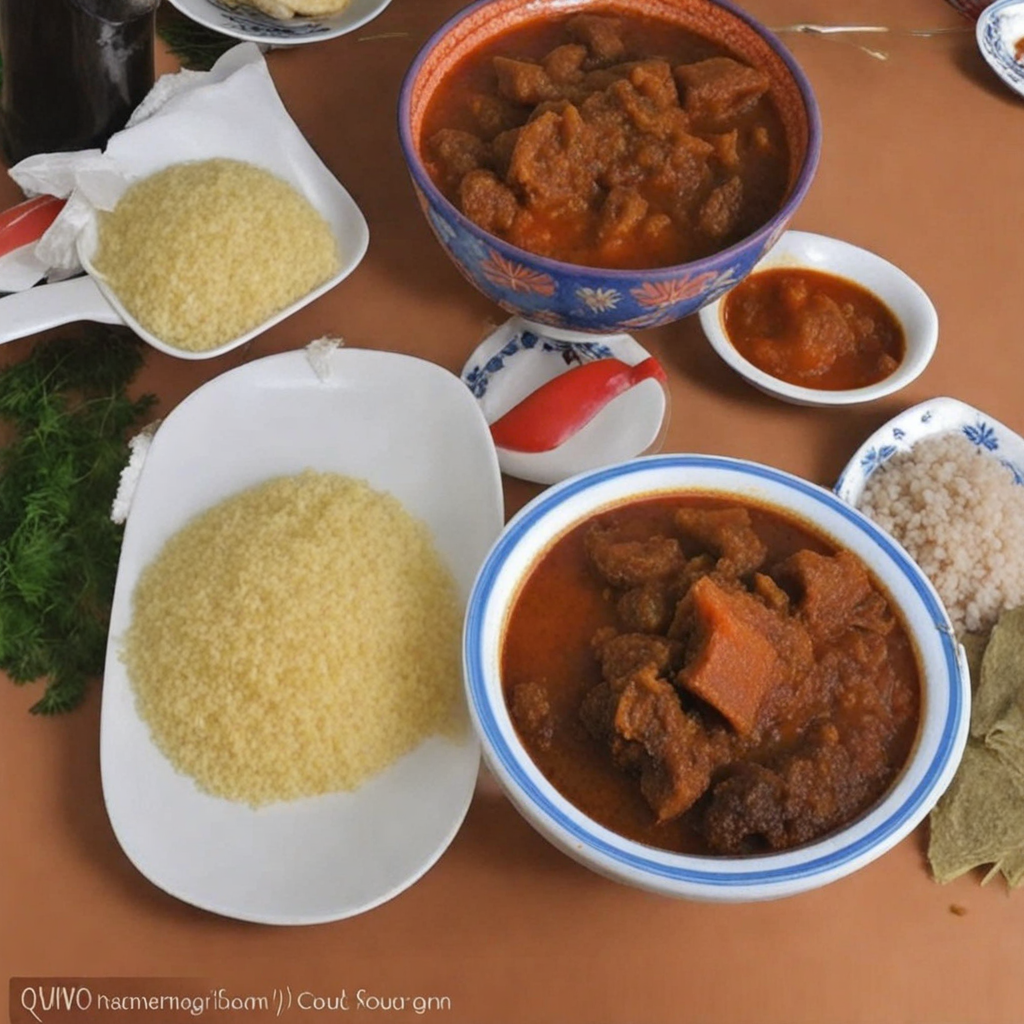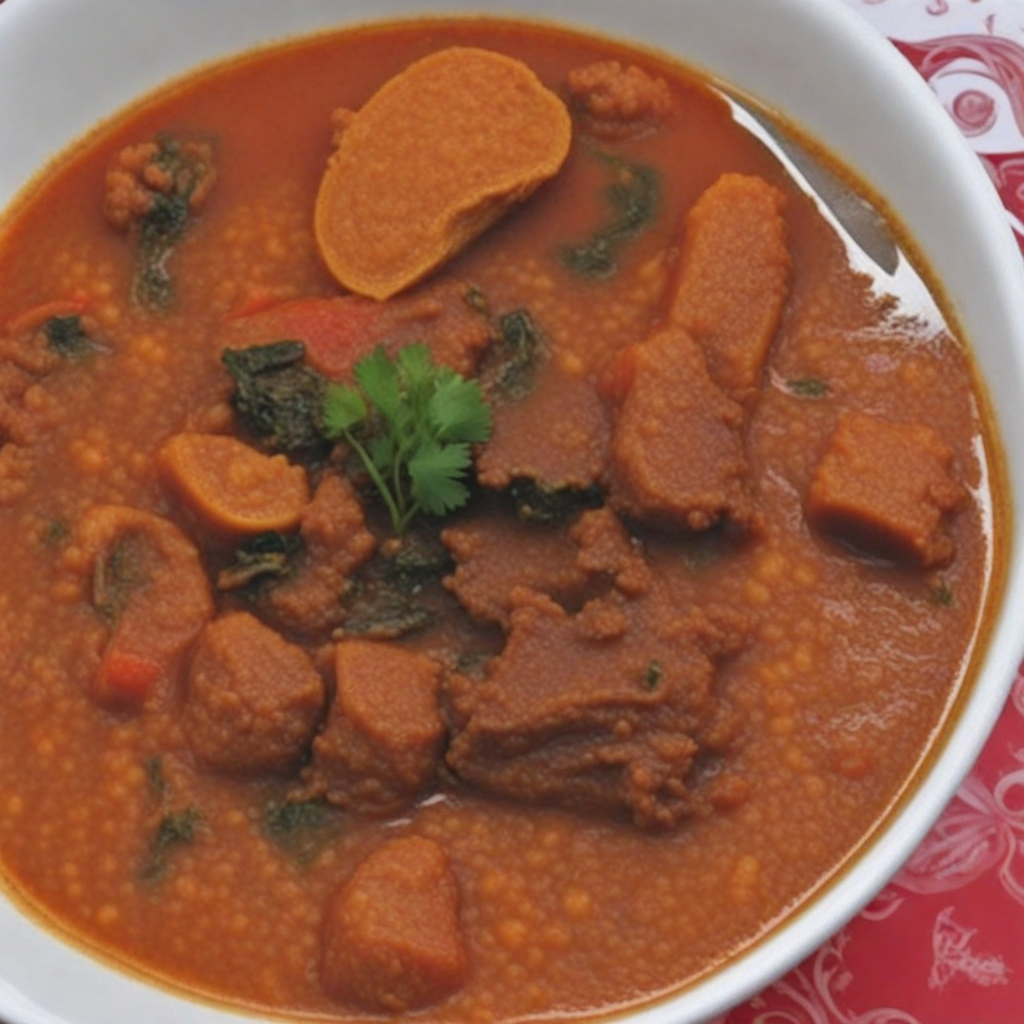Owo Soup
Owo Soup, a traditional dish hailing from the southwestern region of Nigeria, particularly among the Ekiti and Ondo states, is a rich and flavorful stew that showcases the culinary heritage of the Yoruba people. The soup has a storied history, rooted in the rich agricultural practices and diverse ecosystems of the region. It is often served during special occasions, celebrations, or as a comfort food, signifying its importance in social gatherings and cultural practices. The flavor profile of Owo Soup is both complex and inviting. The dish is characterized by its deep, earthy taste, which comes from a harmonious blend of its key ingredients. It is known for its relatively mild spiciness, allowing the natural flavors of the ingredients to shine through. The soup is often described as savory and slightly nutty, with a silky texture that envelops the palate. The combination of spices and seasonings used in preparation adds a warm depth, making it a satisfying and hearty meal. Preparation of Owo Soup involves several steps that highlight the craftsmanship required in Nigerian cooking. The first step is to prepare the base, typically made from a blend of locust beans (iru) and ground crayfish, which contribute a unique umami flavor. Palm oil is then added, giving the soup its distinctive color and richness. The use of meat, commonly goat, beef, or chicken, is essential, with the proteins being precooked to infuse their flavors into the broth. Dried fish or stockfish can also be included for
How It Became This Dish
Owo Soup: A Journey Through Flavor and Culture #### Introduction to Owo Soup Owo soup, a traditional dish hailing from Nigeria, particularly the Yoruba ethnic group, is a remarkable representation of the country’s rich culinary heritage. Known for its unique combination of flavors and textures, Owo soup is a staple in many Nigerian households, often served with pounded yam, fufu, or rice. This dish goes beyond mere sustenance; it embodies the cultural identity, traditions, and communal values of those who prepare and enjoy it. #### Origins of Owo Soup The origins of Owo soup can be traced back to the Yoruba people of southwestern Nigeria. The Yoruba, one of the largest ethnic groups in the country, have a diverse culinary tradition influenced by geography, climate, and age-old agricultural practices. Owo soup is believed to have been created as a means to celebrate special occasions, bringing families and communities together. The name "Owo" itself has various interpretations, with some sources suggesting it translates to "wealth" or "riches" in the Yoruba language, reflecting the soup's rich ingredients and flavors. Traditionally, Owo soup was prepared during significant ceremonies such as weddings, festivals, and communal gatherings, highlighting its role in social bonding and cultural expression. #### Ingredients and Preparation Owo soup is distinct for its rich, savory flavor, which comes from a combination of key ingredients. The soup primarily features a base of ground melon seeds, known as "egusi," which is known for its nutty taste and thickening properties. The preparation of Owo soup involves roasting and grinding the melon seeds, which are then cooked with various spices and seasonings, including palm oil, onions, and chili peppers. Another notable ingredient is the addition of assorted meats, such as goat, beef, or chicken, and sometimes fish, which add depth and complexity to the dish. The use of locust beans (iru) is common as well, imparting a unique umami flavor that elevates the overall taste profile. The soup is usually seasoned with salt and other spices, creating a warm, inviting aroma that fills the kitchen. The preparation of Owo soup is often a communal affair, with families coming together to cook and share the experience. This aspect of communal cooking underscores the importance of Owo soup not only as a meal but as a cultural event that fosters connections among family members and friends. #### Cultural Significance Owo soup is more than just a dish; it is a symbol of cultural identity among the Yoruba people. The act of cooking and sharing Owo soup is deeply ingrained in the social fabric of Yoruba culture. It is often served during significant life events, such as naming ceremonies, weddings, and holidays, where the preparation and consumption of the soup signify abundance, unity, and prosperity. The soup is often accompanied by rituals and traditions, such as blessing the meal or sharing stories and songs that reflect the history and values of the community. By passing down recipes and cooking techniques from one generation to the next, families not only preserve their culinary heritage but also strengthen their bonds and sense of belonging. Moreover, Owo soup has gained recognition beyond the Yoruba community, becoming popular in various regions of Nigeria and among the Nigerian diaspora. Its unique flavors and comforting nature make it a favored dish at gatherings, celebrations, and even restaurants that serve Nigerian cuisine, showcasing the adaptability and appeal of this traditional soup. #### Evolution Over Time The evolution of Owo soup reflects broader changes in Nigerian society and the culinary landscape. Traditionally, Owo soup was made with locally sourced ingredients, emphasizing the use of seasonal produce and regional flavors. However, globalization and urbanization have introduced new variations to the dish. Today, you may find Owo soup prepared with different types of proteins, including exotic meats or seafood, catering to diverse tastes and dietary preferences. Additionally, the rise of the internet and social media has played a pivotal role in popularizing Owo soup. Food bloggers and influencers have showcased the soup in various formats, sharing recipes and cooking techniques that appeal to a global audience. This exposure has led to fusion adaptations, where elements of Owo soup are integrated into other cuisines, creating innovative dishes that celebrate the essence of Nigerian culinary heritage while embracing modern influences. Furthermore, the health consciousness of contemporary society has sparked interest in the nutritional benefits of Owo soup. The use of melon seeds, which are high in protein and healthy fats, has drawn attention from nutritionists and health enthusiasts. As a result, Owo soup is increasingly recognized not just as a flavorful dish but also as a wholesome option that can be incorporated into a balanced diet. #### Conclusion Owo soup is a testament to Nigeria's rich culinary history and the cultural significance of food in uniting communities. From its origins among the Yoruba people to its evolution into a beloved dish across the globe, Owo soup embodies the spirit of sharing and celebration. As families continue to gather around the pot of Owo soup, they not only savor its delightful flavors but also partake in a tradition that underscores their identity, values, and connections to one another. As we look to the future, Owo soup remains a vibrant symbol of Nigeria's diverse culinary landscape, inviting people from all walks of life to experience its warmth, flavor, and the stories it tells. Whether enjoyed at a family gathering or a celebratory feast, Owo soup continues to nourish not just the body but also the soul, reminding us of the power of food in bringing people together and preserving cultural heritage.
You may like
Discover local flavors from Nigeria






